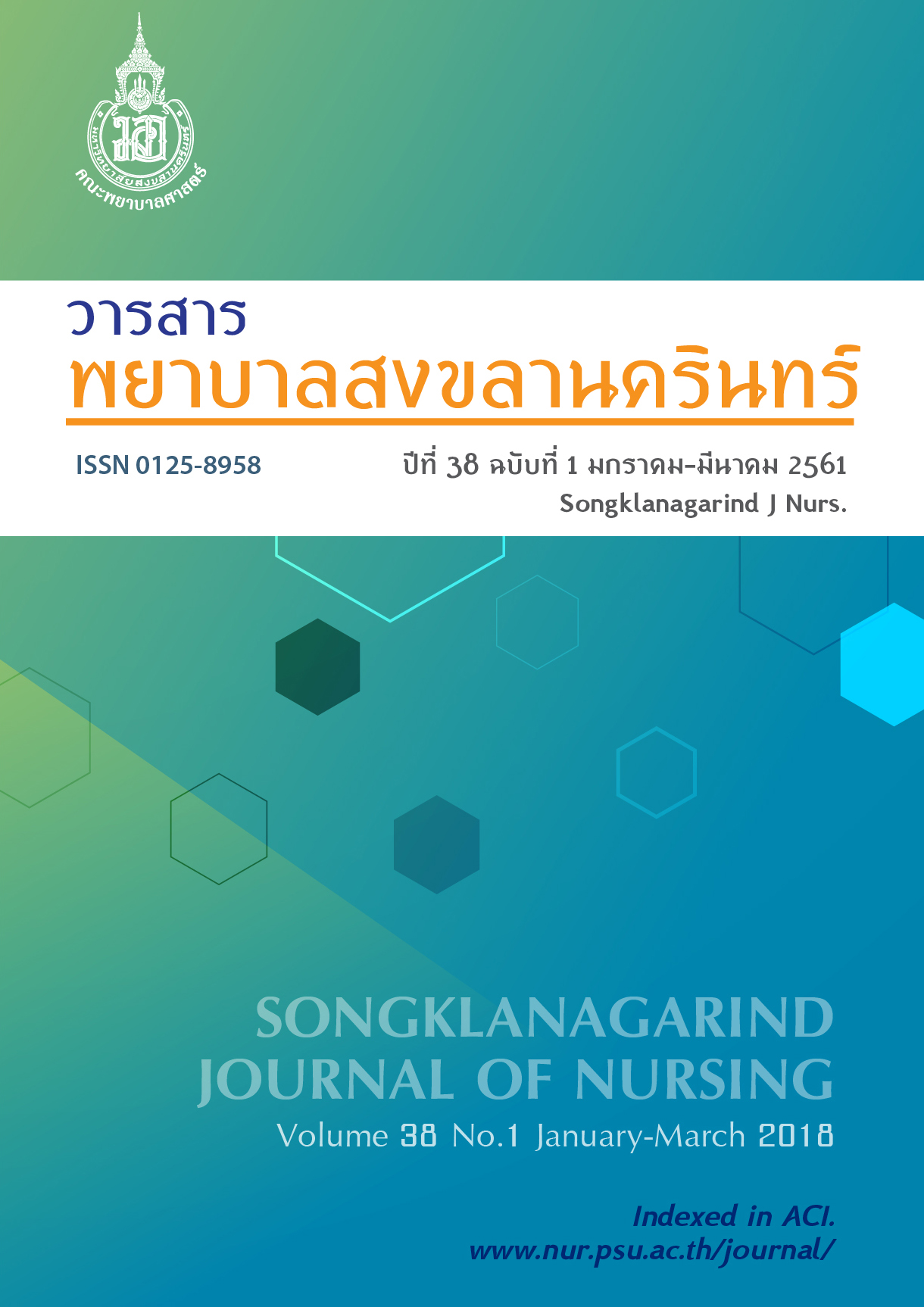The Effects of the Resilience-Enhancing Nursing Program on Life Goals Among Pregnant Teenagers: A Randomized Controlled Trial
Main Article Content
Abstract
Currently, teenage pregnancy is a significant problem and social concern. Teenage pregnant women who lack resilience are more likely to face adversity including the risks and complications associated with physical and mental health from a potentially crisis situation of pregnancy. This study aimed to evaluate the effects of the Resilience-Enhancing Nursing Program (RENP) on life goals in pregnant teenagers. A randomized controlled trial was conducted with 130 participants who were pregnant teenagers (experimental group=64, control group=66). The RENP was developed by the researcher and included three steps: step 1: establishing a trusting relationship, step 2: improving the resilience, and step 3: monitoring and encouraging the resilience practice. The instruments for data collection consisted of a demographic data form, the resilience scale and life goals scale. All instruments were content validated by five experts, and reliability was examined using Cronbach’s alpha coefficient. Data were analyzed using percentage, mean, standard deviation, Chi-square, independent t-test, and repeated measures ANOVA.
The findings revealed that the mean score of life goals of participants at the 4th week, and 8th week were significantly higher than that before receiving the program (p< .001). In addition, the participants in the experimental group had a significantly greater improvement in mean score of life goals than did the control group at the 4th and 8th week (p= .001). This program can guide nurses to encourage pregnant teenagers in setting life goals that can improve their quality of life.
Article Details
References
2. World Health Organization. Adolescent pregnancy [Internet]. 2014 [cited 2016 Oct 5]. Available from: http://www.who.int/maternal_child_adole-scent/topics/maternal/adolescent_pregnancy/en/
3. Mercer RT, Walker LO. A review of nursing interventions to foster becoming a mother. J Obstet Gynecol Neonatal Nurs. 2006; 35(5):568-82. doi: 10.1111/j.1552-6909.2006.00080.x
4. Salo nen AH, Kaunonen M, Åstedt-Kurki P, et al. Effectiveness of an internet-based intervention enhancing finnish parents’ parenting satisfaction and parenting self-efficacy during the postpartumperiod. Midwifery. 2011; 27(6):832-41. doi:10.1016/j.midw.2010.08.010
5. Perry SE, Hockenberry MJ, Lowdwemilk LD, et al. Maternal child nursing care. 5th ed. Loius: Misouri; 2014.
6. Ingrid B, Majda R, Dubravka M. Life goals and well-being: Are extrinsic aspirations always detrimental to well-being?. Psychological Topics.2009;18(2):317-34.
7. McGaha-Garnett V, Tyler H, Alvarez A. Examining emotional resilience of adolescent parenthood and the role of school counselors. American Counseling Association Vitas Online; 2013.
8. Weed K, Keogh U, Borkowski J. Stability of resilience in children of adolescent mothers. J Appl Dev Psycho. 2006; 27(1):60-77. doi:10.1016/j.appdev.2005.12.007
9. Flynn L. The adolescent parenting program: Improving outcomes through mentorship. Public Health Nurs.1999; 16(3):182-9.
10. Collins B. Resilience in teenage mothers: A follow-up study. Wellington: Ministry of Socail Development; 2010.
11. Grotberg EH, editor. Resilience for today:Gaining stregth from adversity. Westport, CT: Praeger; 2003.
12. Grotberg EH. What is resilience? How do you promote it? How you do use it?. Westport, CT: Praeger; 2003.
13. Ahern RN. Adolescent resilience: An evolutionaryconcept analysis. J Ped Nurs. 2006; 21(3):175-85. doi:10.1016/j.pedn.2005.07.009
14. Minnick DJ, Shandler L. Changing adolescent perceptions on teenage pregnancy. Child Sch. 2011; 33(4):241-8. doi:10.1093/cs/33.4.241
15. Logan C, Holcombe E, Manlove J, et al. The consequences of unintended childbearing.Washington, DC: Child Trends and National Campaign to Prevent Teen Pregnancy. 2007; 28:142-51.
16. Lumbiganon P, Laopaiboon M, Gűlmezoglu AM, et al. Method of delivery and pregnancy outcomes in Asia: The WHO global survey on maternal and perinatal health. The Lancet. 2010; 375(9713):490-9. doi: 10.1016/S0140-6736(09)61870-5
17. Pillitteri A, editors. Maternal and child health nursing: Care of the childbearing and childrearingfamily. 7th ed. Lippincott Williams & Wikins: Wolter Klower; 2015.
18. Zeller DL. The program minimized randomization2.01 [Internet]. 1997 [cited 2014 May 1]. Availablefrom: http://mahmoodsaghaei.tripod.com/Softwares/randalloc.html.
19. Cohen J, editors. Statistical power analysis for the behavioral sciences. 2nd ed. New jersy: Lawrence Erlbaum Associates; 1988.
20. Twenge JM, Campbell WK, Freeman EC. Generational differences in young adults’ life goals, concern for others, and civic orientation. J Pers Soc Psychol. 2012; 102(5):1045-62. doi:10.1037/a0027408
21. Grouzet FM, Kasser T, Ahuvia A, et al. The structure of goal contents across 15 cultures. J Pers Soc Psychol. 2005; 89(5):800-16. doi:10.1037/0022-3514.89.5.800
22. Takviriyanun N. Development and testing of the resilience factors scale for Thai adolescents. Nurs Health Sci. 2008; 10(3):203-8. doi:10.1111/j.1442-2018.2008.00398.x.
23. Sivaraman Nair KP. Life goals: The concept and its relevance to rehabilitation. Clin Rehab. 2003;17(2): 192-202. doi: 10.1191/0269215503cr599oa
24. Dyer JG, McGuinness TM. Resilience: Analysis of the concept. Arch Psychiatr Nurs. 1996; 10(5):276-82. doi: 10.1016/S0883-9417(96)80036-7
25. Brunwasser SM, Gillham JE, Kim ES. A meta- analytic review of the Penn resiliency program’s effect on depressive symptoms. J Consult Clin Psychol. 2009; 77(6):1042-54. doi:10.1037/a0017671.
26. Kumpfer K. Factors and processes contributing to resilience. In: Glantz M, Johnson J, editors. Resilience and development: Springer US; 2002. p. 179-224.

